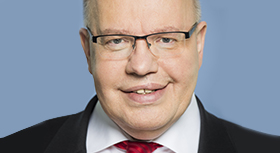You can subscribe to the Energy Transition
Order the international edition of the "Energiewende direkt" Newsletter here.
How can levies on carbon emissions from fossil fuels be imposed in a way that is socially just and climate-friendly? This question is being addressed by a current research project on carbon pricing. The project also examines the impact a carbon price might have on the economy and society.
Find out moreGermany is making progress on climate action. In 2020, greenhouse gas emissions dropped by 40.8% compared to 1990, and by 8.7% compared to 2019. This is not only due to the coronavirus crisis, but also to a large extent to structural effects. In fact, there has been a significant and continuous decrease in greenhouse gas emissions since 2017.
Find out moreA future in which nature and the climate are protected, fewer people suffer hardship and social cohesion is strong – this is the vision that Germany's Sustainable Development Strategy is working towards. The strategy's recent update presses ahead with the energy transition and climate action.
Find out moreAnd why could district heating soon be at the heart of the heat supply in densely populated areas? Come this way to find out more!
Find out more
'We must grasp this opportunity. We must do this properly. We must enter into agreements. We must enter into binding commitments – at global and regional level and in our own respective countries. This is not just in the best interest of the climate, it is in the best interest of our economies. The future will show that it is possible to reconcile sustainability, climate action, and prosperity.'
Peter Altmaier, Federal Minister for Economic Affairs and Energy, speaking at the BETD and commenting on the U.S.'s return to the Paris Agreement.
This time in 'What the press say': The reason why many Germans are modernising their heating systems during the pandemic, and why offshore wind power should make us optimistic about the energy transition.
Find out moreIn German only
This is how State Secretary Andreas Feicht summarised the work being conducted in the ‘Smart Energy Showcases’ (SINTEG) when speaking at the closing conference for the WindNODE showcase on 16 March 2021. WindNODE is one of five model regions involved in the successful research programme that was initiated by the Federal Ministry for Economic Affairs and Energy. Across Germany, SINTEG tested innovative solutions for the energy transition. During the WindNODE closing conference, representatives of government, business and science discussed specific outcomes of several years’ work. State Secretaries from all the Länder involved also discussed the current surcharge system, using the data from the wind-to-heat storage installation in Nechlin as a basis. A regulatory experimentation clause put in place by the Federal Ministry for Economic Affairs and Energy was available to all SINTEG projects to enable regulatory learning and, in this case, was used to ensure that operations at the storage installation were economically viable. There was wholehearted agreement among the participants in the closing conference that the network created by SINTEG has delivered impressive results and that it should be continued. To learn more about the showcases, consult the WindNODE 2020 yearbook.
In German only
On 17 March 2021, the Federal Government adopted the Seventh Report on the development of the maritime industry in Germany and its future prospects, a document tabled by the Federal Government’s Coordinator for the Maritime Industry, Norbert Brackmann. Mr. Brackmann stated that the sector is hit particularly hard by the coronavirus crisis. At the same time, he said, the report showed that maritime industry should be considered as a forward-looking high-growth industry that ought to regard the crisis as an opportunity. He went on to say that the sector is actively involved in the energy transition and is investing in research and development. The Federal Government has set itself the target to further modernise and digitise shipping – a sector that already provides for comparatively climate-compatible and environmentally friendly transport, given the volumes being handled. One billion euros in funding will be made available for further modernisation and digitisation. Due to the pandemic situation, the 12th National Maritime Conference, which was due to take place in Rostock, will be held as a digital event on 10 and 11 May 2021.
In German only
In its expertise entitled 'A carbon adjustment mechanism as a cornerstone of a Climate Club', the Scientific Advisory Council of the Federal Ministry for Economic Affairs and Energy has spoken out clearly in favour of a multilateral approach to climate action. Under the experts’ proposal, carbon leakage is to be prevented by the EU, the U.S. and other important trading partners through a Climate Club, which would instate a minimum price to be paid for carbon emissions. At the external borders of the member countries of the Carbon Club, a carbon adjustment levy would then be charged on imports from third countries to make up for the discrepancy between the lower carbon pricing there and the prices paid within the Carbon Club. Th Scientific Advisory Council warned against the introduction of a unilateral carbon adjustment mechanism by the EU, as is currently being planned, as this might well result in retaliatory measures rather than benefit the climate. Instead, they are saying, climate action is only possible through multilateral cooperation.
Order the international edition of the "Energiewende direkt" Newsletter here.